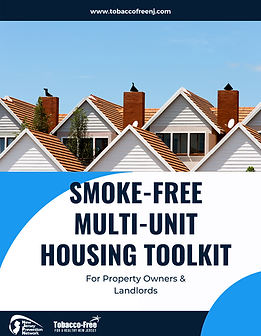

SMOKE-FREE MULTI-UNIT HOUSING
Tobacco Free for a Healthy NJ (TFHNJ) works to increase opportunities for Smoke-Free living for all New Jersey residents. We accomplish this by providing assistance to housing authorities, property managers, and landlords who want to implement or improve their Smoke-Free Housing policy, reduce costs attributed to smoking and improve the health of their residents.
-
Take the Smoke-Free Housing Pledge, and keep your homes Smoke Free!
-
Housing authorities, landlords, property managers and residents
-
Receive your copy of the Smoke-Free Multi-Unit Housing Toolkit for Landlords
-
View NJ smoke-free housing properties on TFHNJ’s Smoke-Free Housing Directory
PROPERTY MANAGERS
What can TFHNJ offer?
TFHNJ can help transition your residential
building or complex to being 100% Smoke-Free.
The transition steps include:
-
Create a custom plan and timeline for your facility
-
Inform residents of the intended change in policy
-
Provide free outdoor / indoor signage to display
-
Educate tenants of current laws related to smoking
-
Provide smoking related information and resources
-
Provide local and state wide Cessation Resources
-
Create new tobacco policy / amend all leases
-
Promote your status as a Smoke-Free Residence
What are top 3 Benefits
of 100% Smoke-Free Housing?
1. Reduce Operating Costs
-
Reduce turnover cost
-
The turnover cost of a unit with tobacco smoke damage versus a non-smoking unit are 2-7 times greater
-
Cleaning
-
Painting
-
Flooring
-
Appliances
-
Bathroom
-
-
-
Reduce risk of fire
-
Some insurance companies offer property insurance discounts for being a 100% Smoke-Free property
-
Smoking is a leading cause of residential fire and the number 1 cause of fire death in the United States
-
-
Reduce maintenance cost due to cigarette litter
2. Improve Tenant Health
-
The surgeon general declared there is no risk-free level of contact with secondhand smoke
-
In a multi-unit building 35% to 65% of the air in any unit is shared from other units and common areas
-
According to the American Association of Heating, Refrigeration and Air Conditioning Engineers, the only means of effectively eliminating health risks associated with indoor exposure to tobacco smoke is to ban smoking activity
3. Decrease Tenant Complaints
-
Secondhand smoke complaints and unit transfer requests reduce greatly in a 100% Smoke-Free Complex
-
A NJ statewide survey shows 78% of tenants would choose to live in a 100% Smoke-Free complex
-
Less than 14% of the New Jersey population still smoke.
HOUSING RESIDENTS
What can TFHNJ offer?
TFHNJ can help in many ways regarding second hand smoke prevention, 100% Smoke-Free Housing,
and more including:
-
Provide education on your rights related to smoking
-
Provide a search engine of Smoke-Free Housing in NJ
-
Contact your housing facility to discuss current tobacco policy and offer assistance in going 100% Smoke-Free
-
Provide smoking related information and resources
-
Provide local and state wide Cessation resources
What are your rights?
-
Non-smoking tenants who are afflicted with breathing disorders may use the Americans with Disabilities Act and/or the Fair Housing Act to bring legal action against landlords for not making reasonable accommodations to protect these tenants from secondhand smoke in common areas or in their apartments.
-
People who smoke are not a protected legal class, there is no “right to smoke” under any U.S. law.
-
Smoke-free policies are like any other lease provision such as trash removal or pet restrictions.
-
Public and Private facilities have the right to adapt smoke-free policies
-
The 2006 NJ Smoke-Free Air Act requires almost all indoor public places and workplaces to be 100% smoke-free. This includes “common or shared” areas in multi-unit housing, such as apartment building lobbies, stairwells, common rooms, etc. as per the NJ Dept of Health 2007 Regulation comments.
-
The 2007 NJ Dept of Health regulations requires that no outdoor smoke migrate into an indoor public place that is smoke free. This means no smoking by entrances, exits, and windows to all common areas of a multi-unit housing building.
-
No smoking includes all tobacco products, all electronic smoking devices and the smoking of medical marijuana.
FEDERAL RULING
HUD issued the smoke-free rule on November 30, 2016. The rule requires all public housing to have a smoke-free policy in effect by July 31. The smoke-free policy must prohibit smoking in all indoor areas, including dwelling units, and within 25 feet of all indoor areas.
RESOURCES
INDOOR SIGNAGE

OUTDOOR SIGNAGE

TOOLKIT
Email TFHNJHousing@njpn.org to receive FREE signage and our Toolkit
WEBINAR - Legal Aspects of Smoke-Free Housing Policies
REGIONAL COORDINATORS

.png)

